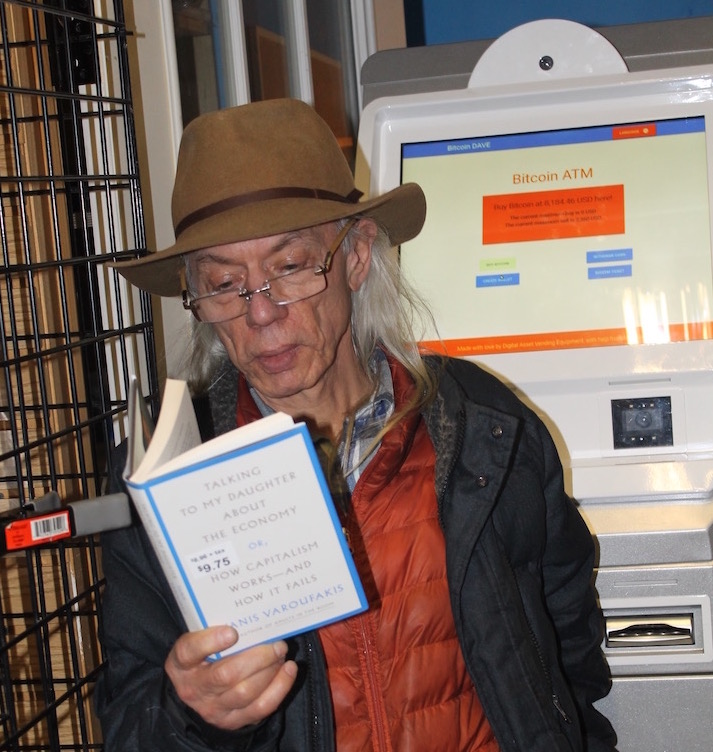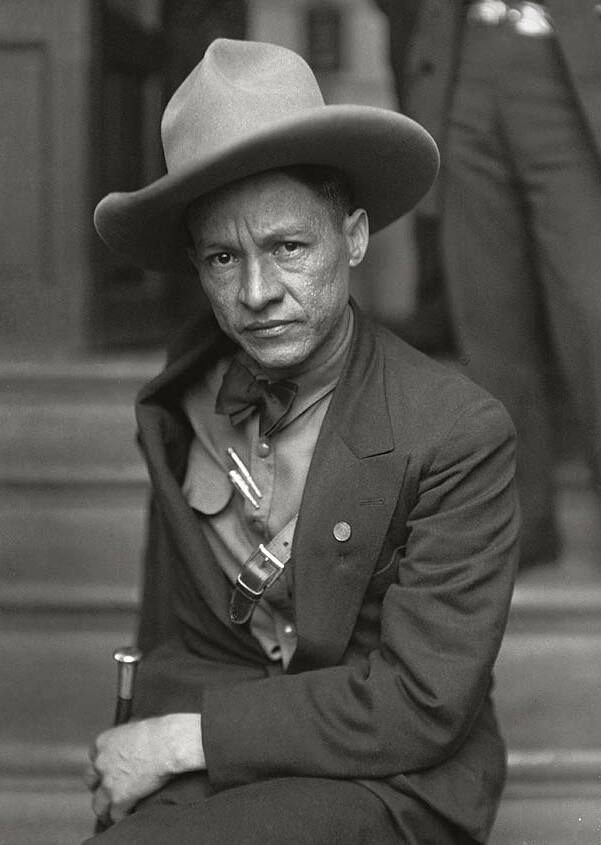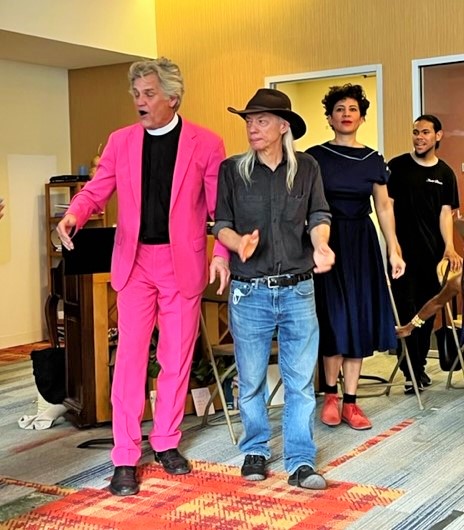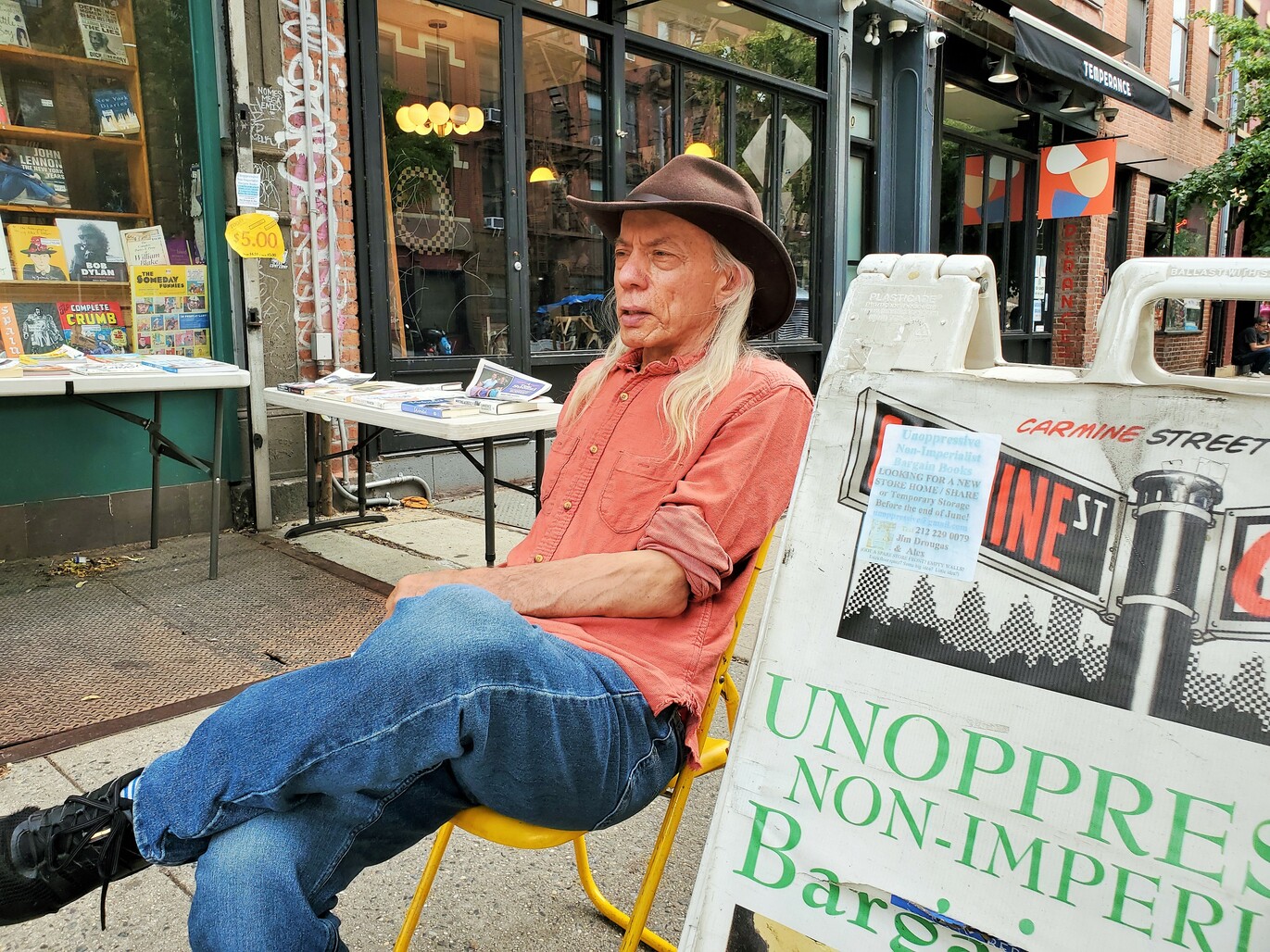BY DANIEL BARENBLATT | A specter is haunting the Village.
The specter of an unoppressive, non-imperialist, nonexistent bookstore: that sorely missed, people’s landmark of Carmine Street, which high rent forced to close last July. Its last vestiges — sidewalk tables and a few tall shelves inside a nearby yuppie bistro — mostly faded out in late November. The bistro still offers a few books for sale in its window.
Yet Jim Drougas, the store’s legendary un-owner, perseveres tirelessly in his quest to reopen. He tells me that several vacancy prospects in the Village look promising, though a deal remains elusive. He is well aware of what is at stake. Resurrection of the 32-year old bookshop, amidst this era’s neutron bombscape of endless “For Lease” empties, would give an immense lift to the morale of local residents and international tourists alike.
Here anew would shimmer the bohemian, vibrant Greenwich Village of the popular imagination, as against unpopular reality. Once again would that familiar refrain of random passersby echo across the Drougas doorway: “I can’t believe they’re still in f—in’ business!”
Its name notwithstanding, Jim’s emporium was quite varied in its offerings, and not what one might term a radical left bookstore. William Blake artwork on the wall, posters and front exterior banner evinced a non-imperialism of 18th-century vintage. But in these times of hypergentrification, even the quaint act of running an idealism-toned small business — and a bookshop, no less — complete with a sleeping cat (Alexandra) in the window, came across as revolutionary in its verve and defiance.
James Milton Drougas is a personal friend of mine, and in 2021 and ’22 I was immensely gratified to see Jim and his store (they are basically the same entity) garner some long-overdue media attention with an award-winning documentary film, followed by a flurry of television, radio and newspaper coverage ahead of the closing.
I also think that the best path to truly knowing the store and where it is headed runs through something as yet unattempted: a very up-close and unoppressive, non-imperialist bargain interview. So here we go:
DB: An anxious planet wants to know: what are the chances of your bookstore rematerializing any time soon?
JD: Very likely. Maybe not until the late spring/early summer. Some viable options are turning up around that time.
DB: Do you plan on hosting special events in the new place, as you did at 34 Carmine St.? I recall the socially relevant film showings, a Yippie memorial, free stand-up comedy shows and more.
JD: Even more so. Each of the potential folks I intend to share the space with have their own ideas for events, and I would collaborate and also portend more interesting episodic moments.
We would have psychedelic mushroom panel discussions, and health and healing measures and a jazz music ensemble, if the size of the next space permits. I have a dear piano player composer that is my irrepressible journalist goddaughter from China, and art gallerists, like my goddaughter from Vermont. Journalists from TV, radio and online or print. A drummer/journalist. Perhaps also a miniseries on video, of the 34 Carmine St. film doc theme, and some print publishing and unimaginable streams of new adventures.
I would love to get support on all those levels, and much is predicted. Or prophesied. (See below).

DB: Your book prices noticeably undercut the competition. How did you select and purchase the books that you sold, and shall one day sell again?
JD: I’m still grabbing very select new hoardings every few week or so from my sources. There are several wholesale companies. Most of the best titles come from returns from other bookshops, delivered in truckloads and sorted across miles of floors and scanned and listed and packed and sold. Some of the titles are sold off in auctions by title to companies. The best titles come in rather finite numbers from the returns. The key is to get the best ones before the other guys do… . That’s how I procure them.
How I decide which ones to get and how many to get is pure instinct slightly modified by 48 years of bookselling and prior 20 years of diligent reading. So actually taste plays a large part. Personal, instinctive taste based on my subjective, gut consideration of what is important. In truth, my acquisitions have magical, synchronic proportions. It’s like my fingers just find the right books on their own, whether in wholesale Web sites, or the floor of a warehouse or spreadsheets. The books I want and need are magnetically pulled to me somehow. I’m always amazed that I can sell hundreds of a title such as Fanon’s “Wretched of the Earth” in a matter of weeks, just because they are half-price and prominently displayed. I manifest the best reading instincts in people, from procurement to disbursement.
DB: I was born and raised a Southern boy. Southern Manhattan, that is. Like most other people, I tend to associate cowboy hats and their modern wearers with much that is incongruous with the left and unoppressiveness in America.
How did progressive, Greek-American Brooklynite Jim come to adopt a cowboy hat as his permanent adornment?
JD: Hahaha. I don’t see it that way. Firstly, it’s more a fedora style, but also cowboy culture, at least for me, that connotes a sense of unfettered freedom. It really wasn’t cowboys versus Indians. It was the cavalry and the institutions — the military and the police — against both. The cowboys are a bit reckless, and perhaps wild and whimsical, like me. They fostered a community spirit of mutual aid. A proletariat that was supportive for survival, and there were even isolated moments of union strikes for wages and such. They are not, at least symbolically, oppressive bad guys. There are bad guy cowboys and good guy cowboys. And in Hollywood and Downtown Manhattan the good guys always win.

So my cowboy concept, my personal taste in cowboy culture is indeed heroic, and a bit revolutionary, in a way. You perhaps forget that cowboy culture was at its height when Karl Marx was at his peak. Thus, I create my own cowboy image based somewhat on such heroic Marxist cowboys as Augusto Sandino. But also Yul Brynner in “The Magnificent Seven,” and Woody Guthrie and the unsung Black cowboys that still ride. Perhaps Jonathan Swift’s Gulliver would appreciate the human/horse cowboy connection as redeeming humans somewhat.
DB: A hard-boiled, lefty skeptic might say that authors who took up residence on your shelves like Madeline Albright, Cory Booker and Ai Wei Wei should be considered tools of imperialism. I understand that you received such purist political critiques from some browsing customers. How did you usually respond?
JD: Sometimes we need to look at certain authors more critically than others. Too few authors are perfect or so pure as we might wish… . There needs to be at least some measure of depth, or else we are only preaching to the preachers and leaving the choir no chance to think critically at all. Sometimes we can take what is negative from an author and use it well, but tailor away some of the rest. Then again an “impure” author might have something interesting to say, which can be disputed in parts. We will lose our ability as critical thinkers if we only regard what we consider to be pure and good. Though, I do admit to reducing some titles that I deemed mistakes after consideration or admonition. And I usually only procure minimal quantities of such books that are not as valuable.
I do feel responsible to the public to severely avoid certain works, such as [those of] Ayn Rand — authors who are dishonest in more pervasive levels that appeal to people deceptively, and are too influential in the process. Some people get upset by the appearance of Woody Allen or Dalai Lama books. Authors might be tainted by a segment of their personal history, but that can’t negate everything they ever did or said. I think it’s important to be able to laugh at our own impurities, and laugh along with those who don’t take themselves too seriously, as well. It does help when an author acknowledges their foibles. I can’t cater to every random complaint of that sort. I’d be reduced to a very small size. Even Revolution Books and Bluestockings books carry titles that have nothing to do with their specific purpose. I am not so one-pointed as that.
I remember attending a speech by Tomas Borge in Nicaragua, in which he extolled pluralism, but with careful censure and limitations over its extent. He also said that the Sandinista approach to children and education is not to spoil the young, but to indulge them nonetheless. I was struck by that and perhaps consider my devoted bookshoppers the well-indulged offspring of the bookshop. I mustn’t shield them from every little thing, but protect them from the most dangerous, tempting unworthy things.
DB: Prior to the store’s shutdown, you were lauded and feted by Downtown activists, including Reverend Billy Talen and his choir, who had been striving to help find you a reasonable, affordable new space. That drive has dissipated. It’s like the part toward the end of “It’s a Wonderful Life,” where the whole town assembles and chips in to rescue George Bailey; only in this version they quickly give up, forget about him and saunter away for drinks at Mr. Potter’s new nightclub. Or is that being too judgmental of your neighborhood supporters?

JD: The canonization by Rev Billy was a highlight of my career. So many local politicians and journalists and the Brooklyn Rail magazine and Village Preservation Society have all staged tons of support, mostly revolving around the award-winning documentary film about the shop, “34 Carmine St.,” and the imminent closing. The response to screening of the film in local film festivals was epic. It feels like the bookshop achieved a kind of immortality via cinema. However, I have actually been stalling on any monetary support until I am lined up for a real concrete place to put that kind of support into.
The moral support is ever-present, literally every single time I walk outside, even for as little as half an hour, recently, and adorable people recognize me and cheer me on, like some kind of Jimmy Stewart heroic figure. It is endearing and certainly makes me all the more confident and also obligated to carry on. Firmly not feeling any sense of abandonment, on both sides, I also invoke great faith in my intentions, too.
DB: A few months ago we discussed your idea of opening a new bookstore in a forest clearing in rural Vermont, with silken caravan canopies and Mongolian yurts housing the books, and gentle, woodland creatures drifting about the perimeter. Is that vision still a realistic possibility?
JD: Yes, it could happen. It was a fantasy turned into a prophecy when I told my friend Kai from the Mongolian gift shop. And he was so animated by the idea because his own spiritual teacher was just visiting with him from Mongolia, and she was pressing him to find a place to build yurts, specifically in Vermont, where I have perfect, rolling acreage in the precise geo center of Vermont in the mountains. We could do treehouse mini-bookshops and boathouse-mini bookshops on the pond, each with another theme.
So we soon went to visit there with his wife and a dear journalist friend, and he presented protection ritual chanting and healing sounds for several days in anticipation. Winter in Vermont is difficult, and the idea is a good one but it will also take some time to implement. Today I discussed opening a branch with a dear friend who is now based in Shanghai, with the same shop name for same meaningful books in English. I hear Krishnamurti is very popular in China. What an adorable notion. It reminds me of [deceased publisher of High Times magazine and Yippie/Zippie activist] Tom Forcade’s dream of creating branches of the bookshop that I started with him, in Soho, nearly 50 years ago.
And also of my German colleagues, with whom I worked closely in the ’70s and ’80s, exporting bimonthly 40-foot shipping container loads of tens of thousands of books to them for their iconic, alternative little bookshops all over Germany. The first time we met they were singing “The Internationale” in Chinese over coffee at the end of our meeting. Independent bookshops of the world are already surpassing the chain bookshops, and nothing is lost in the process of reopening. Reincarnating. Remanifesting. Reunoppressing.


Best wishes, Jim, from a fellow bookstore owner and occasional customer over the years during my bookbuying trips to NYC. I hope that whatever is meant to happen happens!
Courage in courage encourage!
I bought shelves and boxes from you. Namsaste..faith will find a space.
ATTENTION TO ALL, ILLUMINATI HAS BECOME WHAT PEOPLE IN DIFFERENT COUNTRY USE TO MAKE MONEY INSTEAD OF HELPING THE POOR THEY NOW TAKE FROM THE POOR BROTHERS AND SISTERS OUT THERE WHO ARE WILLING TO JOIN THIS ORGANIZATION SHOULD BE AWARE OF WHO THEY CONTACT BEFORE SENDING YOUR INFORMATION TO ANY BODY YOU MUST HAVE TO BE CAREFUL BECAUSE WE ARE GETTING SO MANY CONPLAIN FROM NEW MEMBERS I KNOW HOW I SUFFERED BEFORE JOINING THIS ORGANIZATION DONT GIVE UP AM HERE TO HELP THE POOR,THE TALENTED,THE BUSINESS MEN AND WOMEN,TO REACH THEIR GOALS SO FOR MORE INFORMATION ON HOW TO JOIN KINDLY CONTACT ELDER CHIEF Dawson ON HIS WhatsApp NUMBER:+1 (251) 233‑9231 OR EMAIL HIM ON: Officialillumintibrotherhood@gmail.com
Saint Jim,
Yes, best of luck with opening another bookstore in the West Village — The spiritual home of my parents, writer Irving Fiske and Barbara Hall, artist and cartoonist.
In the 1940s, the West Village was called “Tibet” among its denizens, or “Shangri-La.” I hope to see that true Spirit rise again. New York will be so boring if there is nothing hip or ethnic left in the West Village, or the East, for that matter — my own old stomping grounds.
Warm hopes, for you always. –– Ladybelle.